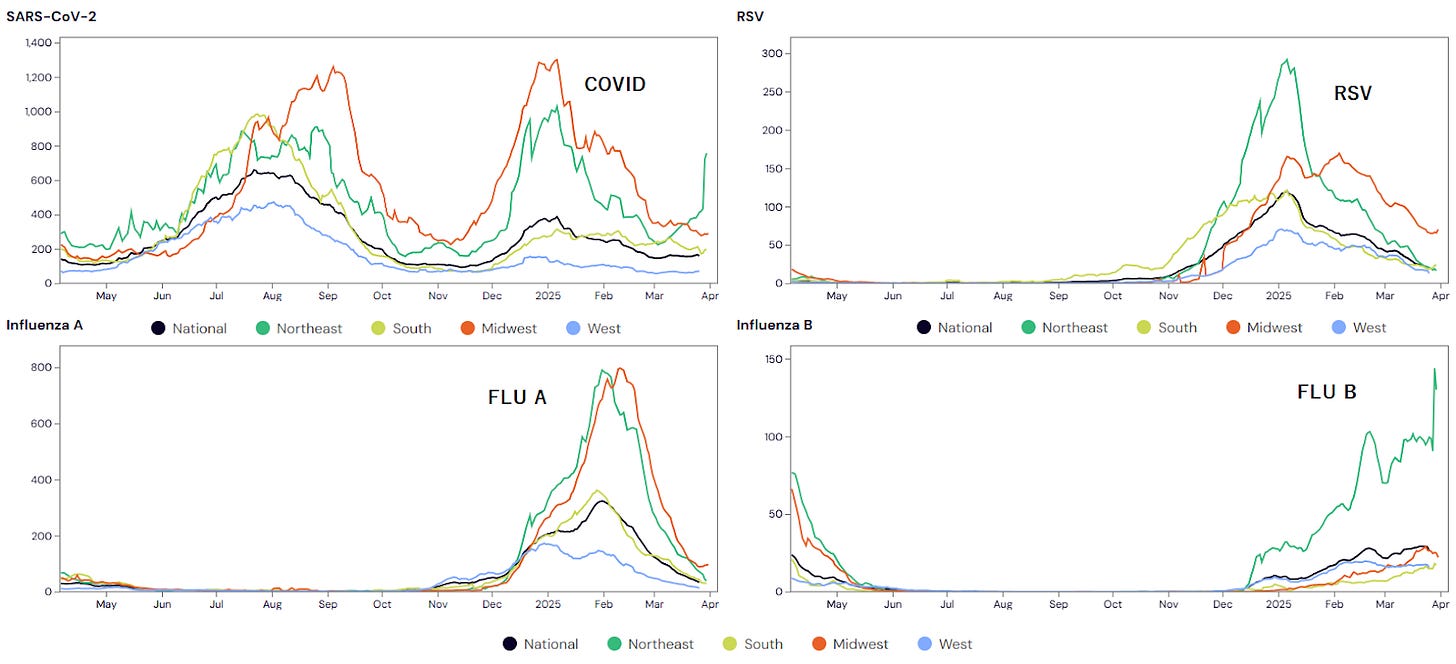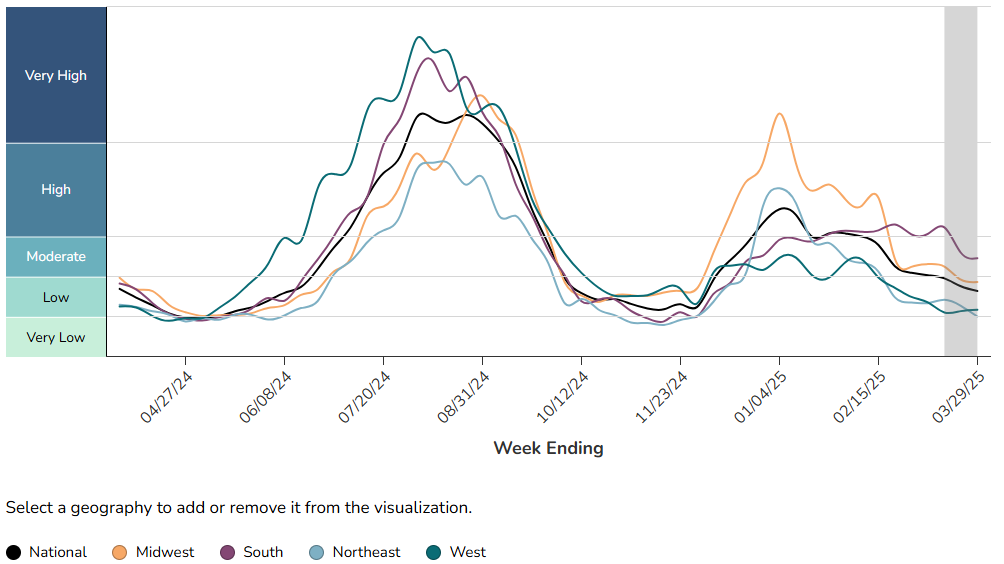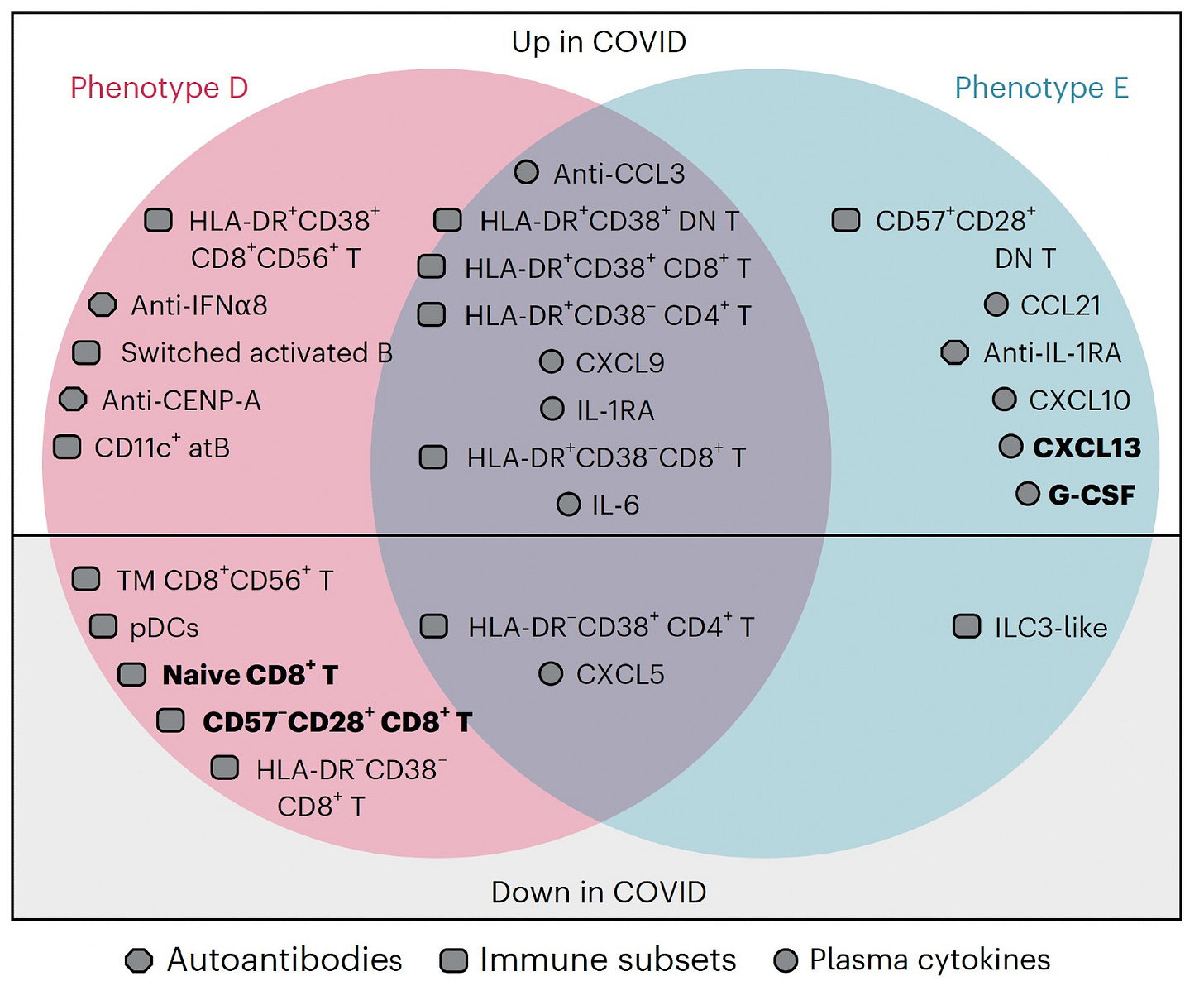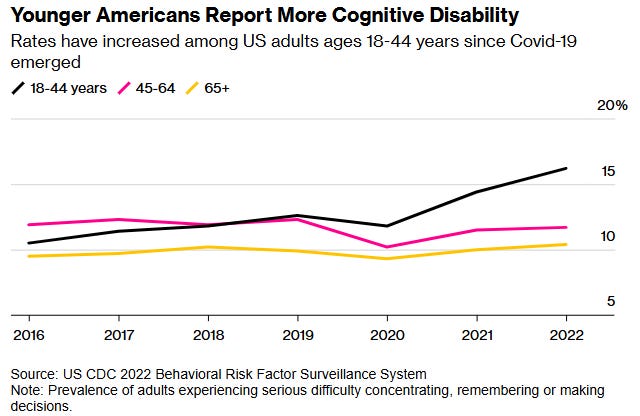===================
According to the CDC, national respiratory virus levels are low for COVID, Flu A, and RSV with some regional variation. Influenza B is still high in the Northeast according to WastewaterSCAN.
From WastewaterSCAN: https://data.wastewaterscan.org/
Emergency room visits for COVID are down across the United States, as are hospitalizations, and deaths from COVID have decreased as well according to the CDC. Moderate COVID wastewater levels persist in the South. In California, wastewater levels are low overall, but Riverside County (Indio) levels of SARS-CoV-2 levels in wastewater is high this week.
CDC SARS-CoV-2 in Wastewater through 3/29/25
From: https://www.cdc.gov/nwss/rv/COVID19-nationaltrend.html
As of April 4, JP Weiland estimates about 260,000 new COVID infections daily in America, with 1 in 127 people currently infected. The LP.8.1 variant continues to slowly push out XEC and now makes up 55% of circulating SARS-CoV-2 infections.
According to the NHS, COVID hospitalizations in the UK are at their highest level this year.
Acute COVID Infections & General COVID Info
A new study of more than 230,000 U.S. veterans found that people who tested positive for COVID-19 had a higher risk of getting bacterial, viral, and fungal illnesses in the year after their initial infection, even if their initial COVID infection was mild. In fact, in the year after a COVID infection, those with mild to moderate COVID infections had higher rates of outpatient infections, hospitalizations, and sepsis. People who had been hospitalized for COVID had a greater risk than those hospitalized for seasonal flu, suggesting that SARS-CoV-2 infections may have a lasting impact on the immune system.
Viral persistence: A man who had recovered from COVID and tested negative on nasopharyngeal swab was found to have SARS-CoV-2 spike protein in his small intestine, especially in ulcerated areas. This was associated with increased Vascular Endothelial Growth Factor (VEGF) and Fibronectin expression, as well as structural changes in intercellular junctions between intestinal cells. SARS-CoV-2 can persist in the gut and cause long-term effects, inducing vascular and epithelial changes, even after it is no longer detected in the nose or throat.
A study from Johns Hopkins of 50 patients with prior B-cell depletion therapy who were hospitalized for COVID showed that prior B cell depletion did not increase 30 day COVID mortality, but it did prolong recovery and increased length of hospital stay by 2 days.
Pediatrics
The Post-COVID Kids Bavaria study showed that >80% of children and adolescents with Long COVID had fatigue, 73% lacked motivation, and 72% had concentration and memory deficits. More than half had psychiatric diagnoses, most commonly adjustment or attention disorders, suggesting that Long COVID in children often affects both body and mind.
Vaccines
The receptor-binding domain (RBD) of the SARS-CoV-2 spike protein often mutates to help it evade immunity. A modified COVID vaccine lacking the spike’s receptor-binding domain (RBD) showed strong lung protection in macaques, suggesting that vaccines targeting more stable regions of the virus may offer broader, longer-lasting protection.
Antiviral Treatments
Australian researchers developed a new antiviral drug called WEHI-P8 that targets a coronavirus enzyme called PLpro and shows strong promise in treating both acute COVID and Long COVID in mice. Unlike Paxlovid, which targets a different viral enzyme and has limited use in Long COVID, WEHI-P8 reduced lung and brain damage and improved behavior and memory in infected mice. This study also introduced a new mouse model that closely mimics human Long COVID symptoms.
A group from Shanghai found that people age 60 and older with type 2 diabetes who were taking Metformin before getting COVID had better outcomes. Those on Metformin had reduced ICU admission rates, pneumonia, shorter hospital stays and lower inflammation. The benefits were not seen in patients under age 60, suggesting that Metformin’s anti-inflammatory effects may be especially helpful for older adults.
A large international study of 400+ antibodies mapped neutralization effectiveness across COVID variants. The results are publicly available and may help guide future antibody therapies and pandemic preparedness by showing which antibody features are most likely to predict real-world protection.
Scientists improved an existing antibody called AZD3152 which had lost effectiveness against new COVID variants due to viral mutations. By using advanced computer modeling and lab testing, they developed a new version, antibody 3152-1142, that works against a wide range of past, current, and predicted future variants including XBB.1.5+F456L.
Belgian researchers discovered a new antiviral drug called CIM-834 that blocks coronavirus assembly by locking the membrane (M) protein in an inactive state. CIM-834 stopped SARS-CoV-2 replication and prevented transmission in mice and hamsters.
Long COVID
A study of over 675,000 patients in southeastern Spain found that being older, female (adjusted odds ratio [AOR] = 1.39), and experiencing symptoms like chest pain (AOR > 1.55) or loss of smell (AOR > 1.5) during the initial COVID infection increased the risk of developing Long COVID. Vaccination, particularly with mRNA vaccines, significantly reduced the risk of getting Long COVID by 90%.
A group from Virginia identified two distinct type 1 immune pathways driving restrictive lung disease in Long COVID patients.
From: https://www.nature.com/articles/s41590-025-02110-0
Treatment with the monoclonal antibody Sotrovimab during the acute phase of COVID infection helped to treat the acute COVID infection and also led to an 8% reduction in Long COVID.
Canada also released its first formal guidelines for post-COVID care which can be found at https://can-pcc.recmap.org/.
COVID and the Brain
A group from Penn created a structured speech therapy protocol for people with post-COVID cognitive symptoms. The personalized, 3-visit program focused on managing mental fatigue and improving memory, attention, and communication, using tools like the spoon theory and cognitive rating scales. All 39 participants reported improved quality of life immediately after the program and again 90 days later.
Jason Gale wrote an excellent review in Bloomberg on the effects of COVID on the brain that is well worth a read. COVID infection has been linked to persistent cognitive issues, including brain fog, depression, and memory problems, raising concerns about a potential future surge in dementia cases. Research has shown that even mild infections can accelerate brain aging, with long-term neurological effects persisting for years, especially in older adults and those with severe cases. Studies indicate that COVID can elevate proteins associated with Alzheimer’s disease, trigger neuroinflammation, and disrupt the immune system, potentially leading to long-term cognitive decline. The economic burden of Long COVID is significant, with analysts estimating an annual cost of up to $1.04 trillion in developed nations due to lost productivity and ongoing disability.
From: https://www.bloomberg.com/explainers/does-covid-lead-to-dementia-how-the-coronavirus-affects-your-brain
A review of 16 studies found that people who had COVID have smaller brain volumes than controls on scans taken more than 6 weeks after infection and that more severe COVID infections were associated with the most difference in brain volume. Neuroinflammation and hypoxia may be a mechanism for brain volume loss after COVID infection.
Researchers used immunoPET imaging with a radiolabeled monoclonal antibody to track SARS-CoV-2's spread in non-human primates. They found that three months after infection, the virus still remained in the lungs and brain. This technique also detected the virus in various organs during the initial infection phase, offering a non-invasive way to study Long COVID’s pathophysiology.
H5N1
This week, Mexico reported its first confirmed human case of H5N1 avian influenza in a three-year-old girl from Durango, who is currently hospitalized in serious condition. Health authorities are investigating the source of infection and have indicated no evidence of human-to-human transmission.
In the United States, the Department of Agriculture confirmed additional H5N1 infections in domestic cats across multiple states, highlighting the virus's continued spread among mammals. Concurrently, the FDA suspended a program aimed at improving bird flu testing in milk, cheese, and pet food due to significant staff cuts, potentially impacting efforts to monitor and control the virus's spread.
U.S. House Democrats initiated an investigation into Health Secretary Robert Kennedy Jr.'s management of the federal response to the bird flu outbreak, expressing concerns over his opposition to poultry vaccination and the potential public health implications.
At least 56 poultry farms in the US have been infected twice by H5N1 bird flu, 17 more farms have been infected three times and 6 more poultry farms in South Dakota have been infected four times by H5N1 bird flu. Experts recommend prevention measures against H5N1 including vaccination of livestock and reducing the density of animals on the farms.
Measles
2025 U.S. Measles case tally as of 4/3/25:
607 Measles cases
97% unvaccinated
12% of cases hospitalized (74 of 607)
2 deaths —> 3 deaths as of 4/6/25
This morning, it was reported that another child has died of Measles in the Texas outbreak. The first Texas measles death was in a 6-year-old girl and Thursday’s death was an 8-year-old girl. Both children died from Measles pneumonia.
As of Friday 4/4/25, the U.S. has reported 607 measles cases in 2025, with almost 500 in Texas with spread in New Mexico, Kansas and Oklahoma. Other states are reporting outbreaks as well. Actual case numbers are probably 4 to 5x what is being reported.
Michael Mina of Harvard wrote an op ed in the NY Times this week entitled “I Study Measles. I’m Terrified We’re Headed for an Epidemic.” He emphasized the importance of vaccination in preventing Measles outbreaks and critiqued public health policies that contributed to declining vaccination rates.
Pediatrician Dr. Tom Nguyen recommends HealthtrackRx to get fast results on measles tests.
Some unvaccinated children in Texas were given high levels of Vitamin A that resulted in liver damage following RFK Jr.’s promotion of it as a cure. “Many of those patients had been in the hospital for a severe measles infection; doctors discovered the liver damage only after routine lab work.” Vitamin A does not protect against the measles, but two doses of the MMR vaccine are 97% effective in preventing the measles.
According to ProPublica, the CDC withheld a report indicating high measles risk in areas with low vaccination rates and shifted its messaging to frame vaccination as a personal choice, aligning with HHS Secretary Robert F. Kennedy Jr.'s known anti-vaccine stance.
The Washington Post reported that “RFK Jr. forced out Peter Marks, FDA’s top vaccine scientist”. A well respected scientist, Dr. Marks was told to resign or be fired from the FDA. He wrote in his resignation letter:
"it has become clear that truth and transparency are not desired by the Secretary [RFK Jr regarding vaccines], but rather he wishes subservient confirmation of his misinformation and lies."
The Department of Health and Human Services (HHS) has appointed David Geier, a vaccine skeptic with a history of promoting false links between vaccines and autism, to lead a federal study on the subject. David Geier has no medical degree and was disciplined by Maryland regulators more than a decade ago for practicing medicine without a license. Mountains of research studies over decades have already shown that there is no no connection between vaccines and autism.
Dr. Titanji posted four helpful alternative sites to get trusted health and vaccine information:
Whooping Cough (Pertussis)
Two infants in Louisiana have died from Whooping Cough amid falling vaccination rates. The Louisiana Department of Health recently stopped promoting vaccination to the public. It is important for pregnant individuals and other family members taking care of young infants to be vaccinated against Pertussis to protect the baby.
Department of Health and Human Services (HHS)
The Trump administration cut $11 billion in federal grants to state health departments across the United States to track, prevent and control infectious diseases like H5N1 and Measles. A US judge has temporarily blocked the cuts, but the money is in limbo for now while several states sue the federal government.
This week, significant layoffs impacted the NIH, CDC, and FDA as part of a sweeping restructuring by the U.S. Department of Health and Human Services. 10,000 people were laid off and another 10,000 retired or resigned. Robert Kennedy Jr. claimed that HHS would rehire 20% of the employees recently laid off, but it was later revealed that no such plan existed.
The NIH saw 1,200 positions cut, including key staff from infectious disease and allergy research.
The CDC faced the elimination of 2,400 roles, notably affecting programs on asthma, air pollution, smoking, gun violence, reproductive health, and climate change. Entire offices focusing on public health areas such as HIV prevention and environmental health were eliminated. The National Institute for Occupational Safety and Health (NIOSH) had over 1,000 positions cut.
The FDA also slashed its workforce by 3,500 employees, raising concerns about its ability to manage drug approvals and public health initiatives effectively.
Funding for COVID and Long COVID research was revoked and then RECOVER Long COVID pathobiology grants were restored.
The Agency for Healthcare Research and Quality (AHRQ) , which helped to improve health care safety, was effectively dissolved on Tuesday.
Yesterday, 5 million Americans across all 50 states protested against Trump, Musk and DOGE in "Hands Off rallies. See more photos here.
From: KHOU
Other News
23 and Me went bankrupt and its assets will be sold off including people's genetic data. The California Attorney General sent out this notice on how to have your genetic saliva sample destroyed and how to delete your 23andMe account. I would recommend deleting things in this order because once you delete your account, you can't go back to have your saliva sample destroyed.
1. Start by destroying your DNA sample under "Preferences".
2. Then revoke permission for research under "Research and Product Consents".
3. Then DELETE your account.
A study from Wales found that getting the shingles (herpes zoster) vaccine reduces the risk of dementia by 20% over 7 years. The findings suggest the vaccine may help prevent or delay dementia, especially in women, possibly by reducing inflammation or reactivation of the chicken pox (herpes zoster) virus. Dr. Eric Topol reviewed all of the data on shingles vaccination and the reduction of dementia here.
Stanford researchers showed that an AI tool can help doctors safely and quickly provide the correct intravenous nutrition to premature babies by using data from medical records to predict the right mix of nutrients. Trained on nearly 80,000 past prescriptions, the algorithm recommends one of 15 ready-made formulas, reducing errors, saving time, and making care more accessible—especially in low-resource settings. Congratulations to Dr. Nima Aghaeepour, Dr. Joe T. Phongpreecha and colleagues on this important work!
A Lupus autoantibody called 4H2 was found to be cytotoxic to brain, lung, and breast cancer cells in culture, but not to normal breast epithelial cells. 4H2 also targeted glioblastoma brain cancers in mice and may work as a cancer treatment in the future.
It turns out that HPV may be bad for your heart. “Human papillomavirus (HPV) is most often associated with causing different types of cancer, but a meta-analysis being presented on March 31 at the American College of Cardiology’s (ACC's) Annual Scientific Session in Chicago suggests that it also poses a significant risk of cardiovascular disease.” This is another reason why HPV vaccination is important.
Researchers followed 4501 college students for 7 years and found that those with low IL-5 and IL-13, plus gastrointestinal issues before they got mononucleosis (glandular fever) caused by the Epstein Barr Virus (EBV) had an 80% chance of developing Myalgic Encephalomyelitis/ Chronic Fatigue Syndrome (ME/CFS).
Sanofi will soon commence a Phase I/II trial of an mRNA vaccine against Chlamydia. Chlamydia is resistant to some antibiotics, so having a vaccine to prevent it could be amazing.
Good news! A new antibiotic Lariocidin works against resistant bacteria, is not toxic to human cells and shows promise in resistant infections in mouse studies. Lariocidin is a lasso peptide and acts on a different mechanism (stops bacterial ribosomes from making proteins).
A cat named Sylvester wandered into a Guide Dog training kennel and now works there to test guide dogs for what trainers call "cat distraction". He routinely strolls in or jumps onto obstacle courses which tests the dogs ability to concentrate on commands.
From: Leamington's guide dog training centre
Have a good week,
Ruth Ann Crystal MD




















.jpg)
No comments:
Post a Comment